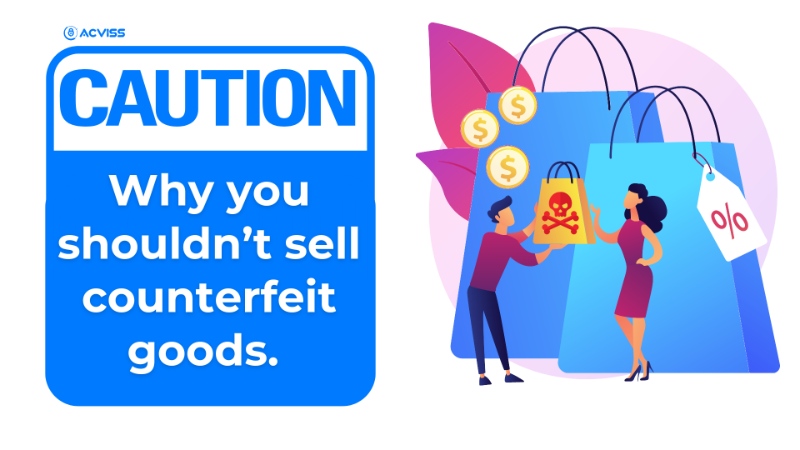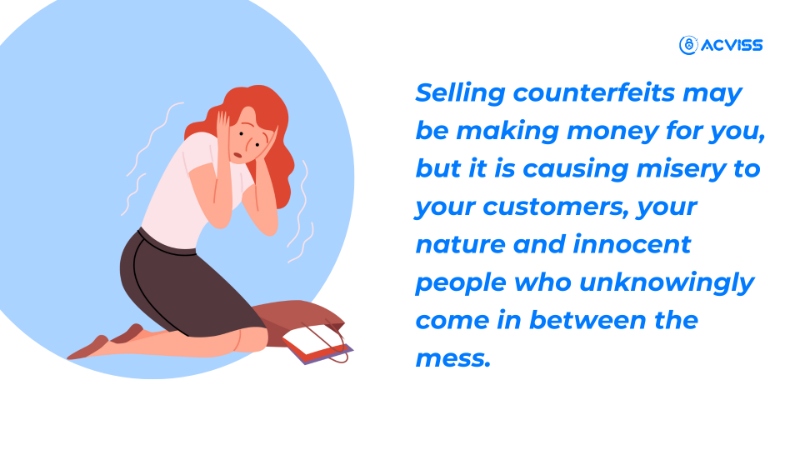Know what happens if you sell counterfeited goods.

The bigger picture
The value of a brand is only as strong as its market. The second you make your product available to the general public, you’re opening up the possibility that someone could go out and create counterfeit versions of your original goods. Counterfeiting has reached a whopping $4 trillion market, which is worth roughly more than the economy of Ireland. Counterfeits are inferior products that are intentionally designed to look like the real thing. This means that they are always made from a cheaper, sub-par material that doesn’t go through the same safety measures and won’t withstand the same quality standards as the original. They are usually sold in bulk and are therefore significantly cheaper than the original ones you would buy from a shop.
How counterfeit goods are sold?
For the most part, counterfeits are sold in the same ways as their genuine counterparts. They may be sold online, at a market, or even at a flea market. After the pandemic, the popularity and comfort of e-commerce platforms have opened a new avenue for counterfeiters. They saw a 20% rise in sales and users during the period when all other trade channels were restricted and shut down. This has enabled them to scam people over the globe without even having a product in hand. On a report from European Union Intellectual Property Office, more than 75% of counterfeit products sold through e-commerce platforms come from china. But it's not online, most countries have their own counterfeit hotspot that sells fake products without fretting. Heera Panna, Tank Road and Palika Bazaar in India rate higher even globally for the variety of fake products sold and bought. Most of these are bought by ordinary people who are not aware of the consequences and don’t have the ability to distinguish between counterfeit and real ones.
What selling fakes means to brands
The worst hits are taken by the brands. Even though most counterfeiters don’t scam people with the intention to cause damage the reputation of the brand, the consequence of selling fake goods results in the same. According to the reports of EUIPO, more than three lakh jobs are lost and $17 billion worth of sales is fallen in the clothing sector alone due to the counterfeit market. Mainly multinational companies and brands with global popularity are the ones who are severely affected by the counterfeit market.
Damage to the reputation
Innocent buyers who are unaware of the fake product will only blame the brand if they incur damage from the product. Even if the customer is aware of the fakes they would still put the brand at the blade’s edge for not taking action to stop fakes in the market and the customer service they offer. This puts a serious dent in the reputation of the brand and its long-term run.
Downfall in sales
This can be fatal for the functioning of the company. Because of its cheaper price and wider availability, people tend to opt for the fake counterpart rather than the original ones. This steeps the sales graph and an existential crisis for the brands. The sales of counterfeit products are at an all-time high, with the Forbes report stating that fake goods worth $1.7 to $4.5 trillion are sold worldwide every year. Every brand across industries is feeling the heat and decrease in their sales pattern.
Money spent on the legal battle
Brands spend millions of dollars every year just to battle the counterfeiter legally. This has been a worry among businesses across industries. Most big-league brands would have a dedicated legal team to fight their battle for them. In 2019 the Mondaq reported a case between Guccio Gucci SPA v. Intiyaz Sheikh, where Gucci filed a case against a manufacturer for selling products with their logo on them. And the court passed an injunction in favour of Gucci and a total of 366,000 INR was asked to be paid by the counterfeiters. Being that the case, it might not be the same for comparatively smaller businesses. They can lose a tremendous amount of money fighting the counterfeiters legally. Even with court proceedings, it can take a very long time to settle the case.
If you are selling counterfeits, don’t!
It's not just the business that’s going to get caught up in the actions, but you too. If you have been caught selling or dealing counterfeits, you’re opening yourself up to a whole host of potential problems. Let’s take a look at some of the most common issues that arise when you go about on the wrong business path.
Prison time
Although the Indian government currently possesses no such section to punish counterfeiting, there exist other laws upon infringement that can be considered criminal and civil offences. Intellectual property rights are a sacred right for every creator and manufacturer and the violation of any such can trigger the Copyright law of 1957 and the Trademarks act of 1999. Counterfeiting any products can be a major breach of these sections which can get the counterfeiter jail time of no less than one year.
Penalty
Copyright and Trademark act under the intellectual property right safeguards every manufacturer, entrepreneur and creator. So infringing any of these ownership rights can immediately be filed before the court. Upon the decision, the counterfeiter will be liable to pay for the damage that it had made to the brand. The total sales they made and the profit they got from the sales will have a major hand in deciding the damages to be paid to the brands.
Reputational damage
Most counterfeiters don’t come out and sell their products directly to customers. They just get innocent sellers or dealers who are unaware of what counterfeit products are or what the legal repercussions are. Such sellers upon getting caught lose their livelihood and will be liable to pay the damages to the brand. The seller loses all of the credibility, reputation and trust they had among the customers. Even though this is not the case every time, it can happen often enough that the real counterfeiters escape the law and justice.

Keep your hands clean!
So even though selling fakes seem more profitable, it won’t bring anything good to you if you are selling them. Counterfeits may be making money for you, but it is causing misery to your customers, your nature and innocent people who unknowingly come in between the mess. So try to keep your hands clean, be aware of the counterfeits around you and be a good person and report them to the authorities Try to buy only the originals, even though they may seem a bit more pricey, they serve a purpose. Buy for the quality and a better future for you and the world.